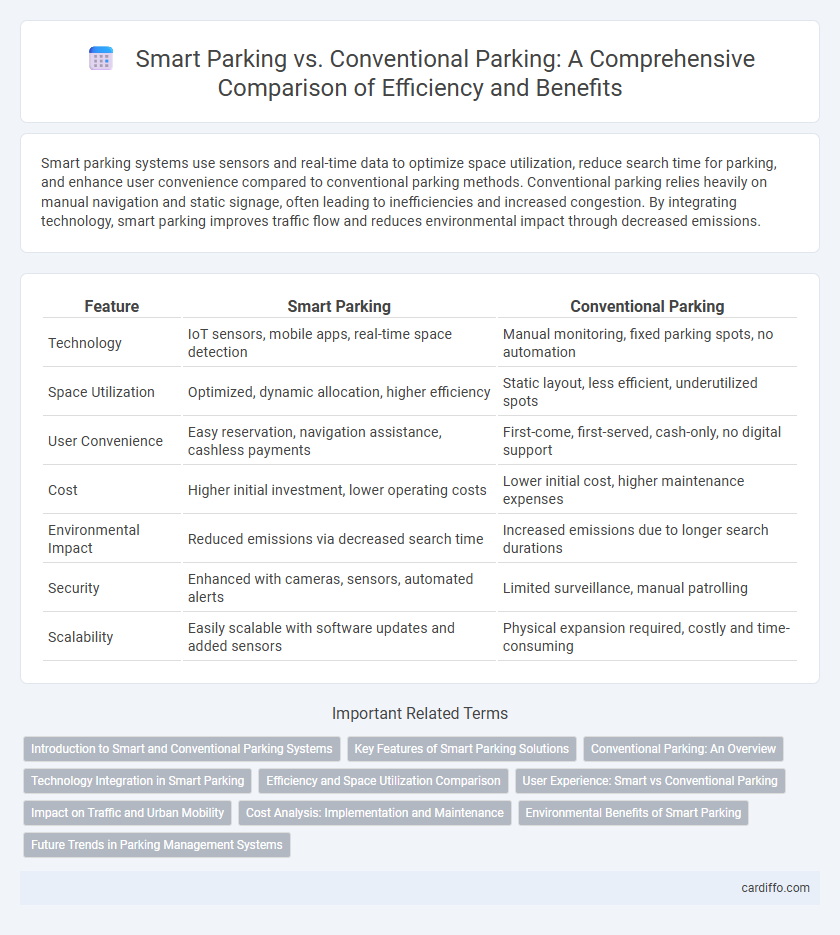Smart parking systems use sensors and real-time data to optimize space utilization, reduce search time for parking, and enhance user convenience compared to conventional parking methods. Conventional parking relies heavily on manual navigation and static signage, often leading to inefficiencies and increased congestion. By integrating technology, smart parking improves traffic flow and reduces environmental impact through decreased emissions.
Table of Comparison
| Feature | Smart Parking | Conventional Parking |
|---|---|---|
| Technology | IoT sensors, mobile apps, real-time space detection | Manual monitoring, fixed parking spots, no automation |
| Space Utilization | Optimized, dynamic allocation, higher efficiency | Static layout, less efficient, underutilized spots |
| User Convenience | Easy reservation, navigation assistance, cashless payments | First-come, first-served, cash-only, no digital support |
| Cost | Higher initial investment, lower operating costs | Lower initial cost, higher maintenance expenses |
| Environmental Impact | Reduced emissions via decreased search time | Increased emissions due to longer search durations |
| Security | Enhanced with cameras, sensors, automated alerts | Limited surveillance, manual patrolling |
| Scalability | Easily scalable with software updates and added sensors | Physical expansion required, costly and time-consuming |
Introduction to Smart and Conventional Parking Systems
Smart parking systems utilize advanced technologies such as IoT sensors, real-time data analytics, and mobile apps to optimize space usage and provide seamless parking experiences. Conventional parking systems rely on manual management and fixed signage, often leading to inefficient space allocation and increased search time for drivers. The integration of smart parking solutions reduces congestion and enhances urban mobility compared to traditional methods.
Key Features of Smart Parking Solutions
Smart parking solutions utilize IoT sensors and real-time data analytics to optimize space usage and reduce search time for available spots. These systems often integrate mobile apps for seamless reservation, digital payment, and dynamic pricing, enhancing user convenience. Conventional parking lacks these technologies, relying on manual monitoring and fixed pricing, leading to inefficiencies and increased congestion.
Conventional Parking: An Overview
Conventional parking relies on designated spaces without technological assistance, often leading to inefficient use of available areas and increased time spent searching for spots. This traditional method typically lacks real-time occupancy data, resulting in higher congestion and frustration in urban environments. Despite its widespread presence, conventional parking struggles to meet the demands of growing vehicle populations and modern smart city initiatives.
Technology Integration in Smart Parking
Smart parking integrates advanced technologies such as IoT sensors, real-time data analytics, and mobile applications to optimize space utilization and enhance user convenience. Unlike conventional parking, which relies on manual monitoring and static signage, smart parking systems provide dynamic guidance, automated payment solutions, and predictive availability updates. This technology-driven approach reduces traffic congestion, lowers operational costs, and improves overall urban mobility efficiency.
Efficiency and Space Utilization Comparison
Smart parking systems leverage sensors and real-time data to optimize space utilization, reducing the time drivers spend searching for spots and increasing overall efficiency by up to 30% compared to conventional parking. Conventional parking relies on fixed layouts with limited adaptability, often resulting in underused spaces and longer vehicle circulation within lots. By integrating IoT technology, smart parking maximizes available spots and streamlines traffic flow, significantly enhancing urban parking management.
User Experience: Smart vs Conventional Parking
Smart parking enhances user experience by providing real-time space availability through mobile apps, reducing the time spent searching for a spot and minimizing frustration. Conventional parking often involves manual searching and reliance on signage, leading to inefficiencies and increased stress for drivers. The integration of sensors and automated payment systems in smart parking further streamlines entry, exit, and payment, offering a seamless and hassle-free experience.
Impact on Traffic and Urban Mobility
Smart parking systems significantly reduce traffic congestion by enabling real-time space detection and guiding drivers directly to available spots, minimizing the time spent searching for parking. Conventional parking often leads to increased traffic delays and higher emissions due to prolonged circling, negatively impacting urban mobility. Integrating smart parking with city infrastructure enhances traffic flow efficiency and supports sustainable urban transportation models.
Cost Analysis: Implementation and Maintenance
Smart parking systems involve higher initial costs due to the integration of sensors, IoT devices, and software platforms, but they reduce long-term expenses through efficient space utilization and lower labor requirements. Conventional parking relies on minimal technological infrastructure, leading to lower upfront costs but increased ongoing expenses related to manual monitoring and maintenance. Over time, smart parking offers a better return on investment by decreasing operational costs and enhancing revenue through dynamic pricing and real-time space management.
Environmental Benefits of Smart Parking
Smart parking systems reduce vehicle idling and circling time by efficiently guiding drivers to available spots, lowering carbon emissions and fuel consumption. These technologies optimize space utilization and decrease the need for expansive parking structures, contributing to reduced land use and habitat disruption. Smart parking solutions integrate with urban mobility networks, promoting sustainable transportation and supporting cleaner air quality in cities.
Future Trends in Parking Management Systems
Smart parking systems utilize IoT sensors and real-time data analytics to optimize space utilization and reduce congestion, offering significant advantages over conventional parking methods reliant on manual monitoring. Future trends highlight increased adoption of AI-driven predictive algorithms for dynamic pricing and space allocation, enhancing efficiency and user experience. Integration with autonomous vehicles and smart city infrastructure is expected to transform parking management into a seamless, fully automated process.
Smart Parking vs Conventional Parking Infographic

 cardiffo.com
cardiffo.com